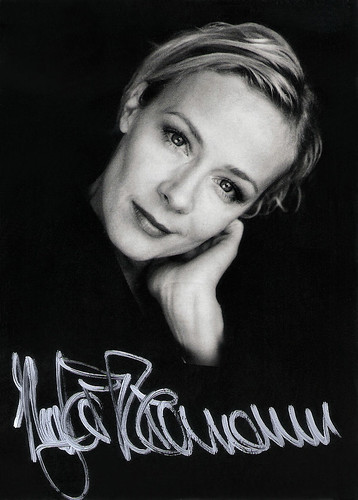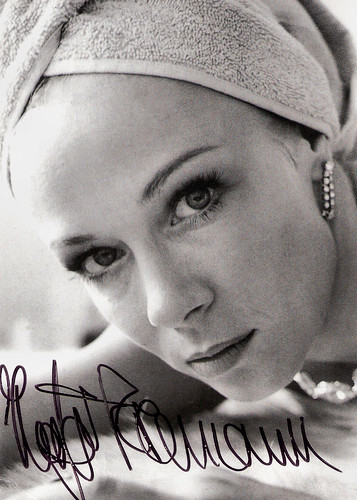German actress and singer Katja Riemann (1963) was a major star of the German cinema of the 1990s, who appeared in such international successful films as Der bewegte Mann (1994) and Comedian Harmonists (1997). Riemann also often worked with the directors Katja von Garnier and Margaretha von Trotta.

German postcard by Franz Josef Rüdel, Filmpostkartenverlag, Hamburg. Photo: Mathias Bothor.

German postcard by Katja Riemann.de. Photo: Mirjam Knickriem.
Katja Hannchen Leni Riemann was born in 1963 in Weyhe-Kirchweyhe, Germany. She is the daughter of two teachers and she has a sister, Susanne, and a brother, Jochen.
Riemann grew up in Weyhe, near Bremen. After high school she went to study at the School of Theatre and Music in Hanover from 1984 to 1986 and the Otto Falckenberg Drama School in Munich from 1986 to 1987. She attended the Westphalian Landestheater in Castrop-Rauxel and came to the ensemble of the Münchner Kammerspiele before the end of her training.
She made her screen debut in the TV mini-series Sommer in Lesmona/Summer in Lesmona (Peter Beauvais, 1985-1986). For her role she won two awards. After this success, several TV roles followed, including the title role in the series Regina auf den Stufen (Bernd Fischerauer, 1992) with Mark Kuhn and Serge Avedikian.
She had her breakthrough in the cinema with Abgeschminkt!/Making Up! (Katja von Garnier, 1993) opposite Max Tidof. The film is a satire about women of the 1990s in search of the men of their dreams.
The following year, she appeared as the girlfriend of Til Schweiger in the hilarious romantic comedy Der bewegte Mann/ Maybe, maybe not (Sönke Wortmann, 1994), also with Joachim Król. The comedy was based on the gay comics by Ralf König. At the time of its release, this was the biggest grossing homegrown film at the German box office. Other comedies followed like Nur über meine Leiche/Over My Dead Body (Rainer Matsutani, 1995).
Riemann reunited with director Katja von Garnier for the road movie Bandits (Katja von Garnier, 1997) with Jutta Hoffmann. The story is about members of a female rock band who escape from prison. Riemann even learned to play the drums for her role. Both the film and soundtrack album were commercially successful in Germany, and Riemann won the Deutscher Filmpreis (German Film Award) for her role.
With director Rainer Kaufmann, she made the films Stadtgespräch/Talk of the Town (Rainer Kaufmann, 1995) with Martina Gedeck and Kai Wiesinger, and the comedy Die Apothekerin/The Pharmacist (Rainer Haufmann, 1997) with Jürgen Vogel and August Zirner. An international success was Comedian Harmonists (Joseph Vilsmaier, 1997) about the legendary close harmony sextet, played by a.o. Ben Becker, Kai Wiesinger and Max Tidof.

German postcard by Franz Josef Rüdel, Filmpostkartenverlag, Hamburg. Photo: Stefan May.

German postcard by Franz Josef Rüdel, Filmpostkartenverlag, Hamburg. Photo: Stefan May, München.
Beside her acting career, Katja Riemann started singing and released her first album Nachtblende in 2000. In 2003, the English-language jazz album Favourites followed with the Katja Riemann octet.
In the cinema she appeared in the pan-European production Novel (Fabio Carpi, 2001) starring Hector Alterio. She starred with Maria Schrader in the film Rosenstraße (Margarethe von Trotta, 2003) about the Rosenstrasse protest where women waited for seven days and nights outside of a Nazi jail for their Jewish husbands. The protests took place in Berlin during the winter of 1943. In Italy, the film won a David at the David di Donatello Awards.
With Von Trotta, she also worked on the psychodrama Ich bin die Andere/I Am the Other Woman (Margarethe von Trotta, 2006) with Armin Mueller-Stahl and Karin Dor. She played with Moritz Bleibtreu in the drama Agnes und seine Brüder/Agnes & His Brothers (Oskar Roehler, 2004).
With Von Garnier, she made an international production Blood and Chocolate (Katja von Garnier, 2007) with Hugh Dancy and Olivier Martinez, but it was a flop. More interesting was the Swiss-German rural drama Der Verdingbub/The Foster Boy (Markus Imboden, 2011). Filmportal.de: “she gives a stunning performance as a cold-hearted farmer, who holds an orphan boy like a slave on her yard.”
A huge box office success was the comedy Fack ju Göhte/Suck Me Shakespeer (Bora Dagtekin, 2013) starring Elyas M'Barek. Riemann played a strict school principal and received for her performance a Best Supporting Actress Nomination at the 2014 German Film Award.
In the drama Die abhandene Welt/The Misplaced World (Margaretha von Trotta, 2015) she co-starred with Barbara Sukowa and Mathias Habich. She also had a small part in the Hitler-in the-21st-century comedy Er ist wieder da/Look Who's Back (David Wnendt, 2015).
At the moment of writing, several films with her are in production, including Fack ju Göhte 3/Suck Me Shakespeer 3 (Bora Dagtekin, 2017), the comedy Forget About Nick (Margaretha von Trotta, 2017) and Subs (Oskar Roehler, 2018).
Katja Riemann is the mother of actress Paula Riemann (also Paula Romy), whose father is Peter Sattmann. Riemann met Sattmann, on the set of Von Gewalt keine Rede (1991), and they had a relationship from 1990 to 1998. Since 2007, she has been the longtime companion of sculptor Raphael Alexander Beil.
Riemann won the Bavarian Film Award three times. Twice as Best Actress in 1993 and 1995, and once for the Best Film Score in 1997. She wrote two successful children`s books, Der Name der Sonne (The name of the sun) and Der Chor der Engel (The choir of the angels), together with her sister Susanne (2002).

German postcard by Franz Josef Rüdel, Filmpostkartenverlag, Hamburg. Photo: Jim Rakete / Photo Selection.
German trailer Abgeschminkt!/Making Up! (1993). Source: alleskino (YouTube).
International trailer for Der bewegte Mann/ Maybe, maybe not (1994). Source: Video Detective (YouTube).
Sources: Filmportal.de, Wikipedia (English and German), and IMDb.

German postcard by Franz Josef Rüdel, Filmpostkartenverlag, Hamburg. Photo: Mathias Bothor.

German postcard by Katja Riemann.de. Photo: Mirjam Knickriem.
The biggest grossing homegrown film
Katja Hannchen Leni Riemann was born in 1963 in Weyhe-Kirchweyhe, Germany. She is the daughter of two teachers and she has a sister, Susanne, and a brother, Jochen.
Riemann grew up in Weyhe, near Bremen. After high school she went to study at the School of Theatre and Music in Hanover from 1984 to 1986 and the Otto Falckenberg Drama School in Munich from 1986 to 1987. She attended the Westphalian Landestheater in Castrop-Rauxel and came to the ensemble of the Münchner Kammerspiele before the end of her training.
She made her screen debut in the TV mini-series Sommer in Lesmona/Summer in Lesmona (Peter Beauvais, 1985-1986). For her role she won two awards. After this success, several TV roles followed, including the title role in the series Regina auf den Stufen (Bernd Fischerauer, 1992) with Mark Kuhn and Serge Avedikian.
She had her breakthrough in the cinema with Abgeschminkt!/Making Up! (Katja von Garnier, 1993) opposite Max Tidof. The film is a satire about women of the 1990s in search of the men of their dreams.
The following year, she appeared as the girlfriend of Til Schweiger in the hilarious romantic comedy Der bewegte Mann/ Maybe, maybe not (Sönke Wortmann, 1994), also with Joachim Król. The comedy was based on the gay comics by Ralf König. At the time of its release, this was the biggest grossing homegrown film at the German box office. Other comedies followed like Nur über meine Leiche/Over My Dead Body (Rainer Matsutani, 1995).
Riemann reunited with director Katja von Garnier for the road movie Bandits (Katja von Garnier, 1997) with Jutta Hoffmann. The story is about members of a female rock band who escape from prison. Riemann even learned to play the drums for her role. Both the film and soundtrack album were commercially successful in Germany, and Riemann won the Deutscher Filmpreis (German Film Award) for her role.
With director Rainer Kaufmann, she made the films Stadtgespräch/Talk of the Town (Rainer Kaufmann, 1995) with Martina Gedeck and Kai Wiesinger, and the comedy Die Apothekerin/The Pharmacist (Rainer Haufmann, 1997) with Jürgen Vogel and August Zirner. An international success was Comedian Harmonists (Joseph Vilsmaier, 1997) about the legendary close harmony sextet, played by a.o. Ben Becker, Kai Wiesinger and Max Tidof.

German postcard by Franz Josef Rüdel, Filmpostkartenverlag, Hamburg. Photo: Stefan May.

German postcard by Franz Josef Rüdel, Filmpostkartenverlag, Hamburg. Photo: Stefan May, München.
I Am the Other Woman
Beside her acting career, Katja Riemann started singing and released her first album Nachtblende in 2000. In 2003, the English-language jazz album Favourites followed with the Katja Riemann octet.
In the cinema she appeared in the pan-European production Novel (Fabio Carpi, 2001) starring Hector Alterio. She starred with Maria Schrader in the film Rosenstraße (Margarethe von Trotta, 2003) about the Rosenstrasse protest where women waited for seven days and nights outside of a Nazi jail for their Jewish husbands. The protests took place in Berlin during the winter of 1943. In Italy, the film won a David at the David di Donatello Awards.
With Von Trotta, she also worked on the psychodrama Ich bin die Andere/I Am the Other Woman (Margarethe von Trotta, 2006) with Armin Mueller-Stahl and Karin Dor. She played with Moritz Bleibtreu in the drama Agnes und seine Brüder/Agnes & His Brothers (Oskar Roehler, 2004).
With Von Garnier, she made an international production Blood and Chocolate (Katja von Garnier, 2007) with Hugh Dancy and Olivier Martinez, but it was a flop. More interesting was the Swiss-German rural drama Der Verdingbub/The Foster Boy (Markus Imboden, 2011). Filmportal.de: “she gives a stunning performance as a cold-hearted farmer, who holds an orphan boy like a slave on her yard.”
A huge box office success was the comedy Fack ju Göhte/Suck Me Shakespeer (Bora Dagtekin, 2013) starring Elyas M'Barek. Riemann played a strict school principal and received for her performance a Best Supporting Actress Nomination at the 2014 German Film Award.
In the drama Die abhandene Welt/The Misplaced World (Margaretha von Trotta, 2015) she co-starred with Barbara Sukowa and Mathias Habich. She also had a small part in the Hitler-in the-21st-century comedy Er ist wieder da/Look Who's Back (David Wnendt, 2015).
At the moment of writing, several films with her are in production, including Fack ju Göhte 3/Suck Me Shakespeer 3 (Bora Dagtekin, 2017), the comedy Forget About Nick (Margaretha von Trotta, 2017) and Subs (Oskar Roehler, 2018).
Katja Riemann is the mother of actress Paula Riemann (also Paula Romy), whose father is Peter Sattmann. Riemann met Sattmann, on the set of Von Gewalt keine Rede (1991), and they had a relationship from 1990 to 1998. Since 2007, she has been the longtime companion of sculptor Raphael Alexander Beil.
Riemann won the Bavarian Film Award three times. Twice as Best Actress in 1993 and 1995, and once for the Best Film Score in 1997. She wrote two successful children`s books, Der Name der Sonne (The name of the sun) and Der Chor der Engel (The choir of the angels), together with her sister Susanne (2002).

German postcard by Franz Josef Rüdel, Filmpostkartenverlag, Hamburg. Photo: Jim Rakete / Photo Selection.
German trailer Abgeschminkt!/Making Up! (1993). Source: alleskino (YouTube).
International trailer for Der bewegte Mann/ Maybe, maybe not (1994). Source: Video Detective (YouTube).
Sources: Filmportal.de, Wikipedia (English and German), and IMDb.
No comments:
Post a Comment